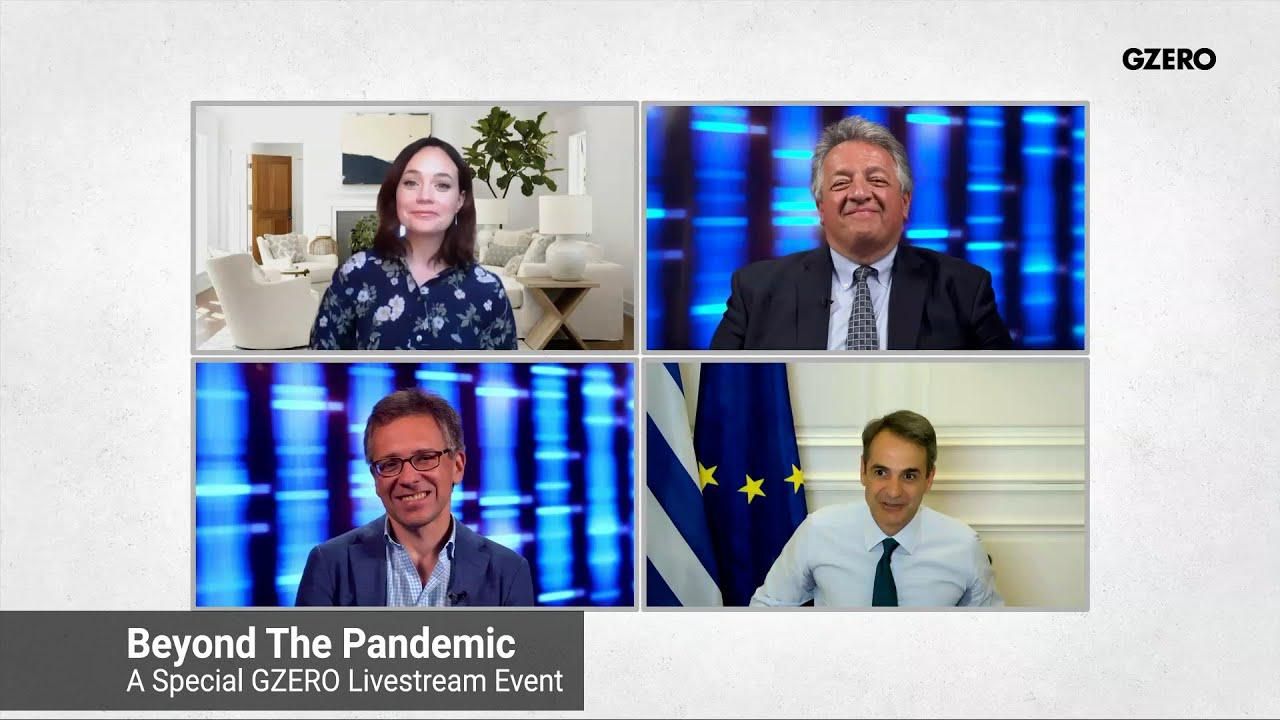Days before G7 leaders meet in the UK to talk about how to "build back better" after the pandemic, experts are warning them that they should not lose sight of the opportunity to learn from the experience of COVID to be more prepared when the next public crisis hits. Below are a few insights from a livestream discussion between political leaders, policy makers, health experts and scientists, entitled Beyond the Pandemic: A Radical New Approach to Health Security, hosted by GZERO Media in partnership with Flagship Pioneering.
It's time to not just move on, but rather think carefully about pre-empting future pandemics by bolstering health security, said Noubar Afeyan, co-founder of Modern and CEO of the Flagship Pioneering venture capital firm. That would be the best way, he explained, to do justice to the global calls for "never again." For Ian Bremmer, president of Eurasia Group and GZERO Media, the window of opportunity to rally the global cooperation that was virtually absent during the worst of the pandemic is closing fast.
Science journalist Laurie Garrett blasted global leadership, especially in countries like Brazil and India, for making the pandemic worse with their politicized responses, and for underplaying the importance of preventive public health. Many governments, she pointed out, obliterated their own public health capacity by putting politics first, for instance in the US by demonizing experts such as Dr. Anthony Fauci and weaponizing the probe into the origins of COVID to blame China.
Prime Minister Kyriakos Mitsotakis offered the lessons Greece has learned from dealing with a massive public health crisis barely after recovering from an economic depression. Mitsotakis also came out in support of the EU's decision to procure vaccines as a bloc over "solidarity," and anticipated that very soon people who still don't want to get vaccinated will realize their lives will become much easier when they agree to get the jab.
For his part, Pfizer CEO Albert Bourla defended his company's opposition to waiving vaccine patents because the doses are for all — rich or poor, east or west — and that the only reason they can't produce more is because not enough raw materials are now available. Pfizer, he added, is looking into expanding mRNA technology to develop better flu vaccines, those that can boost the immune system to fight non-communicable diseases like cancer, and illnesses that stem from genetic mutations.
Other key moments of the program:
- Former US Homeland Security chief Jeh Johnson on a possible COVID commission in the US Congress
- Partners in Health founder Paul Farmer on why only former colonial powers are against lifting vaccine patents,
- Dame Sally Davies, England's former chief medical officer, on why we need to think differently about pandemic data
- Partnership for a Healthier America CEO Nancy Roman on the importance of nutrition in preventing unnecessary deaths in any public health crisis
- Lord Ara Darzi (Flagship Pioneering) on why governments need to take public health threats as seriously as national security
- Lovisa Afzelius (Flagship Pioneering) on why we should care about the Global Pathogen Shield.
Watch the second part of the series, Stronger Partnerships for a Healthier World: Mutually Assured Protection, which was recorded live on Wednesday, June 9.
This live event series was produced by GZERO Media in partnership with Flagship Pioneering. We thank our event partners, Partnership for a Healthier America and Medtronic.
- The 2020 pandemic was hardly “unprecedented,” says historian Niall Ferguson - GZERO Media ›
- How depoliticizing the US health response will save lives (COVID isn't over) - GZERO Media ›
- The myth of feeling safe from the pandemic: former CDC chief Tom Frieden - GZERO Media ›
- COVID ain't over - GZERO Media ›
- What we learned from COVID - GZERO Media ›
More For You
Mastercard Economic Institute's Outlook 2026 explores the forces redefining global business. Tariffs, technology, and transformation define an adaptive economy for the year ahead. Expect moderate growth amid easing inflation, evolving fiscal policies, and rapid AI adoption, driving productivity. Digital transformation for SMEs and shifts in trade and consumer behavior will shape strategies worldwide. Stay ahead with insights to help navigate complexity and seize emerging opportunities. Learn more here.
Most Popular
Despite a ceasefire in Gaza, Israel is still not letting foreign journalists in to independently verify what’s happening on the ground, CNN’s Clarissa Ward tells Ian Bremmer on GZERO World.
On Ask Ian, Ian Bremmer breaks down the steady escalation of US pressure on Venezuela and why direct military action is now a real possibility.
From civil conflicts to trade wars to the rise of new technologies, GZERO runs through the stories that have shaped this year in geopolitics.
